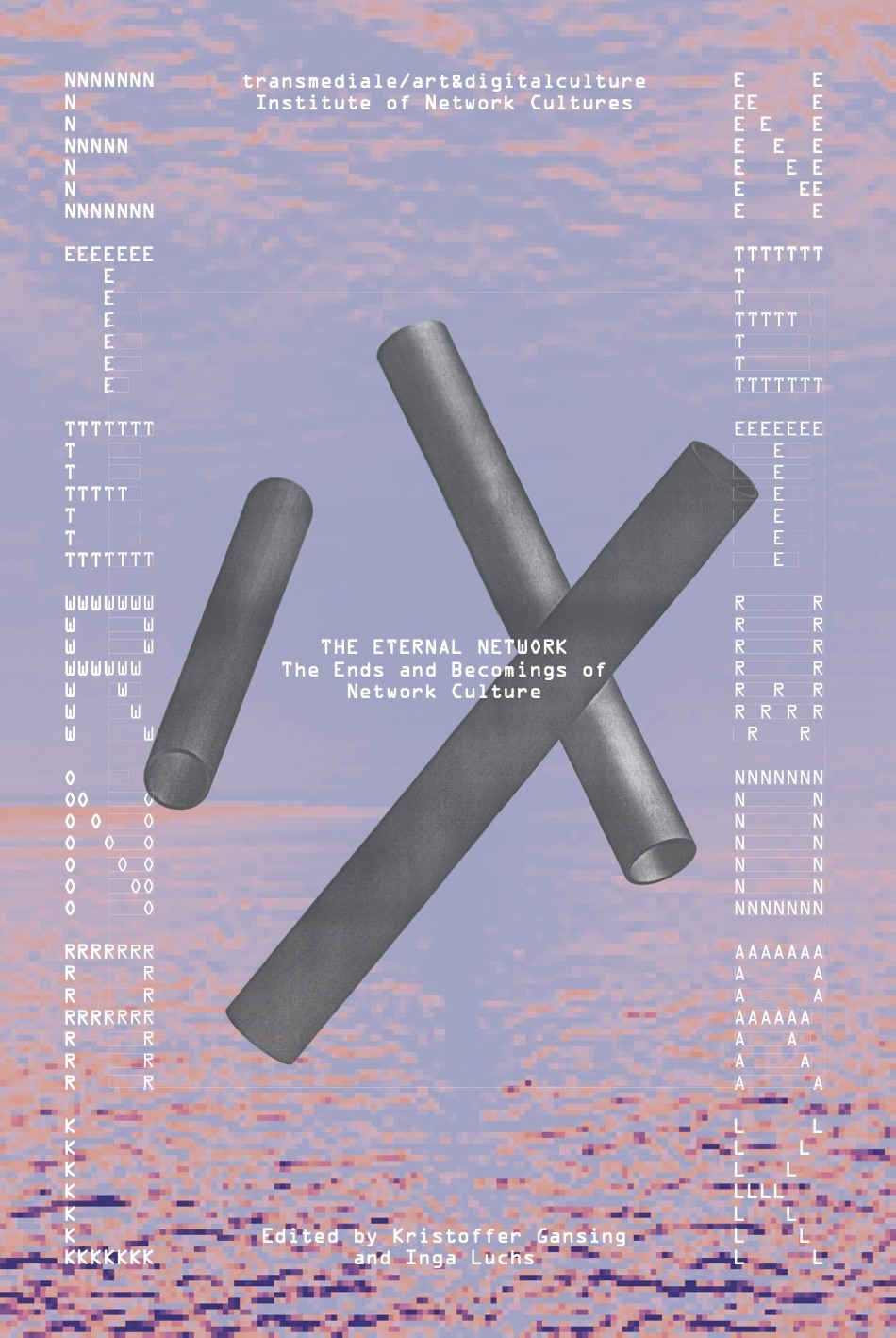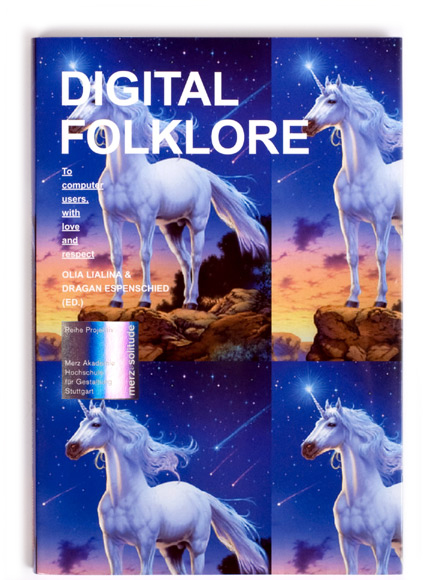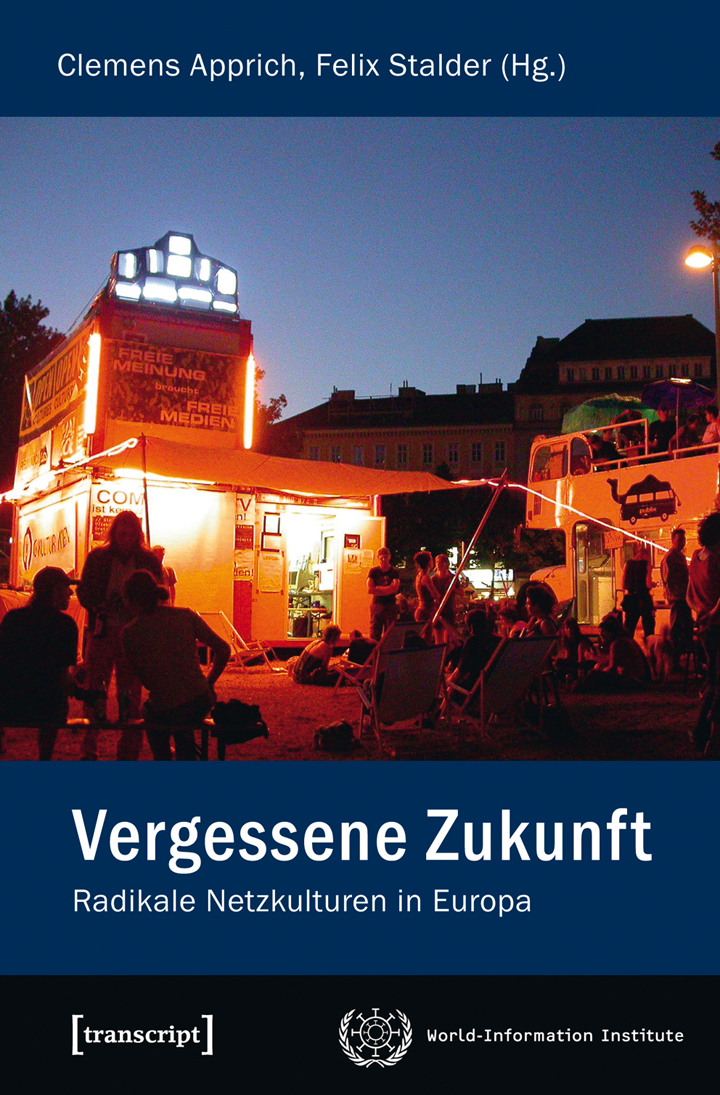Kristoffer Gansing, Inga Luchs (eds.): The Eternal Network: The Ends and Becomings of Network Culture (2020) [EN, DE]
Filed under book | Tags: · federated networks, floss, internet, network culture, networks

“‘The network is everlasting’ wrote Robert Filliou and George Brecht in 1967, a statement that, at first glance, still seems to be true of today’s world. Yet there are also signs that the omnipresence of networks is evolving into another reality. In recent times, the limits of networks rather than their endless possibilities have been brought into focus. Ongoing media debates about hate speech, fake news, and algorithmic bias swirl into a growing backlash against networks. Perhaps it is time to reconsider the contemporary reach and relevance of the network imaginary.
Accompanying transmediale 2020 End to End’s exhibition ‘The Eternal Network’, this collection gathers contributions from artists, activists, and theorists who engage with the question of the network anew. In referencing Filliou’s eternal notion, the exhibition and publication project closes the loop between pre- and post-internet imaginaries, opening up possible futures with and beyond networks. This calls many of the collection’s authors to turn to instances of independent and critical net cultures as historical points of inspiration for rethinking, reforming, or refuting networks in the present.”
Contributors: Clemens Apprich, Johanna Bruckner, Daphne Dragona, Kristoffer Gansing, Lorena Juan, Aay Liparoto, Geert Lovink, Alessandro Ludovico, Aymeric Mansoux, Rachel O’Dwyer, Luiza Prado de O. Martins, Roel Roscam Abbing, Femke Snelting, and Florian Wüst.
Publisher Institute of Network Cultures, Amsterdam, and transmediale e.V., Berlin, 2020
Creative Commons BY-NC-ND 4.0 International License
ISBN 9789492302465
145 pages
English: PDF, PDF (14 MB), EPUB, EPUB (18 MB), HTML (partial, added on 2020-7-16)
German: PDF, PDF (9 MB, added on 2020-12-4)
Olia Lialina, Dragan Espenschied (eds.): Digital Folklore: To Computer Users, with Love and Respect (2009)
Filed under book | Tags: · amateur culture, folklore, internet, internet culture, media art, memes, net culture, network culture, web

“Technical innovations shape only a small part of computer and network culture. It doesn’t matter much who invented the microprocessor, the mouse, TCP/IP or the World Wide Web and what ideas were behind these inventions. What matters is who uses them. Only when users start to express themselves with these technical innovations do they truly become relevant to culture at large.
Users’ endeavors, like glittering star backgrounds, photos of cute kittens and rainbow gradients, are mostly derided as kitsch or in the most extreme cases, postulated as the end of culture itself. In fact this evolving vernacular, created by users for users, is the most important, beautiful and misunderstood language of new media.
As the first book of its kind, this reader contains essays and projects investigating many different facets of Digital Folklore: online amateur culture, DIY electronics, dirtstyle, typo-nihilism, memes, teapots, penis enlargement, …” (from the back cover)
Contributors: Cory Arcangel, Julia Böger, Manuel Buerger, Helene Dams, Dragan Espenschied, Jörg Frohnmayer, Mark Grimm, Christopher Heller, Yunchul Kim, Dennis Knopf, Stefan Krappitz, Florian Kröner, Tobias Leingruber, Olia Lialina, Leo Merz, Bernadette Neuroth, o+ro, johannes p osterhoff, Isabel Pettinato, Michael Ruß, Alexander Schlegel, Bert Schutzbach, Siegfried Zielinski.
Publisher Merz & Solitude (Merz Akademie & Akademie Schloss Solitude), Stuttgart, 2009
Reihe Projektiv series
Designer Manuel Buerger
ISBN 9783937982250, 3937982256
287 pages
Reviews: Pau Waelder (Furtherfield, 2010), Kevin McGarry (Rhizome, 2010), Regine Debatty (We Make Money Not Art, 2010), Alessandro Ludovico (Neural, 2010), Richard Schwarz (The Gap, 2010, DE), Marie Lechner (Libération, 2010, FR), Stefania Bercu (Masters of Media, 2010).
Book website
Publisher
WorldCat
PDF (27 MB)
Comment (0)Clemens Apprich, Felix Stalder (eds.): Vergessene Zukunft: radikale Netzkulturen in Europa (2012) [German]
Filed under book | Tags: · internet, internet culture, media culture, net criticism, network culture, networks, web

“Mitte der 1990er Jahre ist in Europa eine vielfältige Netzkultur entstanden. Während die US-amerikanische Szene den Cyberspace als Raum jenseits der Politik imaginierte, waren die europäischen Netzpioniere darauf bedacht, die Möglichkeiten des Internet für neue politische und kulturelle Initiativen in der realen Gesellschaft zu nutzen.
Anhand von Zeitdokumenten, aktuellen Textbeiträgen und Interviews geht dieser Band erstmals auf die kritische Haltung europäischer Netzkulturen ein. Die Beiträge liefern so wichtige Referenzpunkte zur Gestaltung unserer techno-kulturellen Gegenwart jenseits von Facebook und Google.”
Publisher transcript, Bielefeld, 2012
Kultur- und Medientheorie series
ISBN 9783837619065, 3837619060
348 pages
via ResearchGate
Interview with editor: Vera Tollmann (Springerin, 2013).
Reviews: Verena Pizzini (kulturrisse, 2012), Leonhard Dobusch (Netzpolitik, 2012), Werner Reiter (The Gap, 2012), Martin Schmitt (sehepunkte, 2013).
Comment (0)
